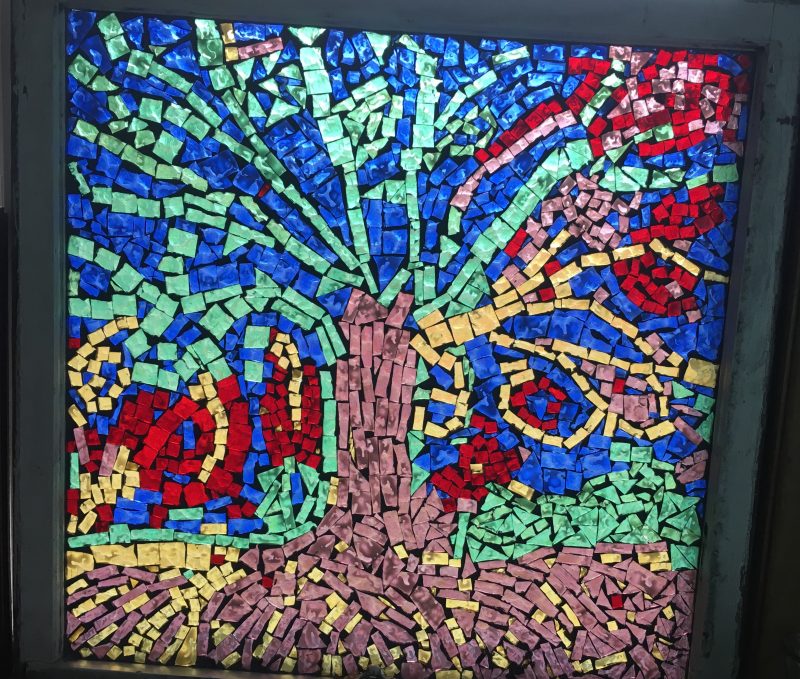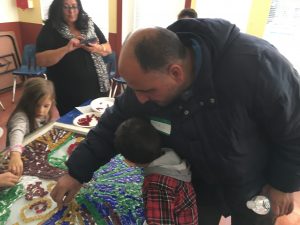
Overwhelm. To bury or drown beneath a huge mass. To give too much of a thing to; inundate.
I had wanted to write this prayer and support update, getting it out before Giving Tuesday so that I could ride the contagious wave of generosity, but then feeling myself drowned beneath a huge mass of emails and Facebook posts asking for financial support from too many good causes and projects, I figured you didn’t need one more. As the number of people in need of help increases, the degree of compassion people feel for them ironically tends to decrease. It seems to be par for the course these days. A sense of overwhelm comes with the news of hurricanes, fires, gun violence, sexual misconduct, human trafficking, wars and rumors of war, the growing refugee crisis, domestic violence, racial and social inequality and the list is endless. It all can seem so huge that our minds can’t take it all in, nor our hearts hold it. This phenomenon is termed the collapse of compassion. Even though we know we should be moved by compassion, that we’re wired for connection and generosity, that our well-being is tied to the well-being of others, we get stuck sometimes.
We carry in our souls not only the pain of the world around us, but of our own needs, burdens and losses. These may range from job transitions or unemployment, to lack of authentic community and loneliness, to losing loved ones through distance or disillusion, disease or death and everything in-between. As we enter the holiday season, alongside beautiful and joyful moments of celebrating cherished traditions, these felt losses and our deepest yearnings for connection and authenticity bring up tender and vulnerable emotions. We need tools and resources to help us navigate these poignant and treacherous waters as we help each other overcome compassion collapse and allow our best selves to come forward.
In my experience, I have found that the ability to do something, perhaps only one simple, tangible act done in service for others or in care for self gets me unstuck, moving me forward and leaving me less overwhelmed or immobilized. When faced with unspeakable tragedy or trauma, the ability to re-establish some kind of normal, everyday routine is vital. Having a daily practice is restorative. We need daily physical, spiritual, emotional, mental, social and economic exercise to keep us healthy and ready for the inevitable challenges that will come. We also need each other to stir one another on to good works.
There was a scientific study using various economic games that suggested that just a single person acting as a “consistent contributor”-someone who chooses to be generous all of the time in their day-to-day lives, regardless of other people’s choices-causes other people in a group to be more generous and cooperative. I am curious and intrigued by the idea that, if instead of giving once a year on Giving Tuesday, we committed to give one gift on every Tuesday of the year to an organization or individual. I wonder how our level of contagious everyday generosity could make a much bigger impact, not only for the world and its needs, but in our own lives. I believe generosity is habit forming and healing. I believe that giving of oneself economically, physically, emotionally, spiritually and socially brings life to others and to oneself. I believe it, because I’ve experienced it in my own life at a time when we were economically fragile and now when we can be more generous. I’ve seen it in the individuals who, over 200 years have given to International Ministries to sustain the work of meeting basic human need through the love of Christ. Someone recently commented that they were sad that IM missionaries were now responsible for “raising their own funds”, not like it used to be when those funds were provided. Even though we might wish there were some magical source that didn’t depend on our personal generosity, those funds have always and still come from individuals and churches who give what they can so that what can’t be done alone can be accomplished together.
I’ll be honest, inviting people to be sustaining partners with me on a regular monthly basis is a bit awkward and I don’t like how vulnerable I feel sharing my need. However, I do love seeing God at work in and through the people I am honored to know as a global servant. It is worth the wonky. In fact, I can’t imagine doing anything else.
Soon you will hear the official word that I have been assigned a new role with International Ministries as a Global Consultant for Training Through Restorative Arts. This will allow me to accept invitations that I have been receiving from partners and colleagues beyond the Spanish speaking regions. Some may be asking, “What will you “do” as a global consultant who travels, but doesn’t live overseas like a “normal” missionary?” Just like I served as a regional missionary, I will travel to serve a wide variety of ministries in community and leadership training workshops, but then come home between trips to be with my husband Gary who is teaching in Washington state. Some may be wondering, “What are Restorative Arts and what do they have to do with Jesus, the Good News and ministry?”
In a nutshell, restorative arts are tools for dealing with overwhelm and healing from inner wounds caused by tragedy and trauma. I engage in first aid for the heart using art. Restorative arts seek the Shalom of God: God’s dream of repair and reconciliation with God’s creation. I engage the arts for restorative and redemptive purposes. Art that is restorative points us in a direction that shows on the outside what is happening on the inside. Healing is an inner process through which a person becomes whole (Lerner, 1994) and can occur on physical, emotional, mental, or spiritual levels. Art has a very important role in the process of healing. Throughout the centuries, and across cultures, creative expression through dance, chants and songs, image-making, and storytelling have been used as a part of healing rituals (Stuckey & Nobel, 2010)
Training in the use of restorative arts allows faith and community leaders to create opportunities for growth and healing in hopeful and life-giving ways. Engaging in the arts teaches healthy expression, creativity, positive self-image, future-oriented thinking, problem-solving, and fosters hope and resilience. Hope orients us towards the future and helps us see positive expectations for our lives. Resilience is the ability to bounce back from adversity and thrive despite exposure to risks and adversities (Metzl & Morrell, 2008). Resilience looks like Tala, a recent refugee from Syria who participated in creating a communal stained-glass tree mosaic last week. He said, “Trees grow in unexpected places and amidst many obstacles. We can be like trees and grow wherever we are planted.”

Tala adds his piece to the mosaic
Practicing the restorative arts such as mosaic-making, music, drama, dance, creative writing and visual arts can allow us to confront both the evil in society and the consequences of personal actions, while at the same time instilling a sense of awe, wonder, joy and beauty; leading us to experiences of confession, worship and hope-filled renewal. Ultimately, restorative art helps us to understand our purpose in the world; encouraging expression in acts of love through service to others with the goal of creating a better world.
As a pastoral artist and trainer, I will partner with IM colleagues, national church leadership and social change organizations to seek justice, healing and transformation through restorative art-making and creative expression. I will seek to encourage, nurture and uplift the servant leaders and those who do the hard work of rescue, relief and restoration. As sinner and saint, I see beauty in broken places, wonder in wounded people, and life in loving God and others. For the many who already give so that I can go, thank you so much. If you haven’t given but are compelled and feel called to come alongside me as a sustaining partner, I invite you to commit one of your Tuesday’s each month to give whatever one thing you can to help folks like Tala to overcome overwhelm and to heal.
Grateful,
Mylinda
“Do not neglect to do good and to share what you have, for such sacrifices are pleasing to God.” –Hebrews 13:16